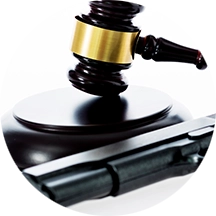What is Embezzlement and How Is it Different From Larceny?
Embezzlement cases generally involve employees who receive either money or property on behalf of their employers during the normal course of their employment but then either (a) steal that money or property or (b) use the money or property in a way that the employer had not authorized. Given this very general and broad definition, embezzlement could cover a number of different scenarios. Here are a few examples:
Example 1. John is a cashier at Walmart. He has access to a cash drawer and cash register and is responsible for taking money from the customers, giving proper change and making sure all of the money is in the cash register at the end of his shift. If John takes money from the register and puts it in his pocket without the permission of Walmart, then he could be guilty of embezzlement.
Example 2. Suzy is a sales employee at Kohl’s, responsible for ringing up customers at the cash register. She has access to discount codes that can be entered into the register to reduce the cost of items being purchased. If Suzy reduces the price of items being sold to her family or friends without having the permission of Kohl’s, she could be guilty of embezzlement.
Example 3. Stan works as an accountant in a doctor’s office. He is responsible for the patient accounts and payments received from insurance companies. When a payment comes in from a patient or an insurance company, Stan is entrusted to record the payment and deposit the money into the doctor’s bank account. If Stan purposefully fails to record a payment received in the doctor’s records and instead puts the money into his own personal account, then he could be guilty of embezzlement. This is an example of embezzlement by misdirection or diversion of funds.
Example 4. Laura is a secretary at an insurance company, with access to computers, monitors, printers, and general office supplies like paper and envelopes. If Laura takes a few of the company’s old computers to a pawn shop without permission, even if she places them on short term pawn with an intent to buy the computers back later and return them to the company, Laura could be guilty of embezzlement. This is an example of embezzlement by misuse of the employer’s property.
Example 5. Jim works at a small paper and office supply distributor. He regularly takes coffee, toilet paper and paper towels home from the office, for his personal use and without the employer’s permission. Jim could be guilty of embezzlement.
These examples all share three common factors. In each example: (1) there is an employer-employee relationship, (2) because of the employer-employee relationship, the employee has access to money or property that belongs to the employer, or might be receiving money or property on behalf of the employer; and (3) the employee has the right to have access to the money or property because of his or her job or employment, but the employee then goes beyond what he or she has permission to do with the property.
These scenarios also illustrate one other point: embezzlement is not limited to stealing money (although money is the most common thing stolen). An employee could embezzle money or property.
What is the Punishment for Embezzlement in Virginia?
In order for a person to be convicted of embezzlement, the property at issue must have some value. The value then determines the maximum punishment. If a person embezzles property valued at $200 or more in Virginia, the penalty range is the same as if the defendant had committed Grand Larceny. Grand larceny of property worth $200 or more is an unclassified felony in Virginia, with a potential punishment range of 1–20 years in prison. If the value of the property is less than $200, then the embezzlement would be a Class 1 Misdemeanor, with jail time limited to a maximum of 12 months.
If You Took Money or Property More Than Once, How Many Charges Will You Have?
The answer is: it depends. Virginia law gives prosecutors a great deal of discretion in determining whether to charge a defendant with more than one count of embezzlement, where the defendant took money or property on more than one occasion. Under the Virginia Code, a prosecutor may combine all acts of embezzlement committed within a six-month period into one offense. The prosecutor may choose to combine acts of embezzlement in order to charge the embezzlement as a felony rather than as multiple misdemeanors. Also, if the acts of embezzlement were part of a continuing scheme (like the example above of Stan the accountant diverting funds over a period of time into his personal account), then the acts can be (a) combined into a single count or (b) possibly combined within month or year increments so that the charges represent conduct over a period of time. All in all, it’s up to the prosecutor, and this may be an issue for negotiations between your attorney and the prosecutor.
If You Took Money or Property But Intended to Give It Back Later, Are You Still Guilty of Embezzlement?
The answer is again: it depends. The prosecutor in any embezzlement case needs to prove that the employee intended (a) to deprive the employer of money or property that belonged to the employer and (b) to use the money or property for the employee’s own benefit. It is unfortunately not a defense that the defendant may have also intended to replace or return the property at some future point in time.
The only exception to this is if the employee is actually authorized by the employer to remove the property from the place of employment in the first place. In these cases, as long as the property is later returned, the employee will have a viable defense to a charge of embezzlement. As an example, think of a paralegal who is authorized to use a laptop provided by her employer law firm to work from home. In this situation, clearly the paralegal has permission to take the laptop home from the office. If she sells the laptop, that could be embezzlement. But if she keeps the laptop at home and does not fail to return it after she leaves the firm for a new job, she has not committed embezzlement.
If You Have Been Charged With Embezzlement, Should You Simply Hire the Attorney Who Quotes You the Lowest Fee?
There is an old adage that may very well hold true for your embezzlement case: you get what you pay for. Sometimes those charged with embezzlement are shocked at the cost of an attorney. But consider both what is required of the defense attorney in an embezzlement case and the consequences of cutting corners in your defense, before you decide to simply hire the attorney who quotes you the lowest fee.
The key to fighting embezzlement charges is often found in the financial records. Putting together the strongest possible defense will often require your attorney to spend countless hours reviewing documents. This time translates to higher attorney’s fees.Having a skilled attorney with experience in reviewing financial documents or working with experts like forensic accountants can mean the difference between a conviction and no conviction, or between a felony and a misdemeanor. Connections with experts and experience in reviewing financial records should be prerequisites in any attorney you choose—and these qualifications again likely come with higher fees.
Although the cost of the best possible defense might be high, the stakes are even higher. Embezzlement has become an aggressively prosecuted crime in Virginia—one that often involves serious risks of incarceration, large amounts of restitution and the lifelong consequences associated with a felony conviction.Over time, judges in Virginia have become increasingly unforgiving in embezzlement cases, because of the violation of a position of trust on the part of the employee in those cases.Many judges will now consider an active jail sentence for embezzlement even if the defendant has no criminal record and the Virginia Sentencing Guidelines recommend only a sentence of probation with no active incarceration. In addition to the real possibility of jail time, a person convicted of embezzlement will also suffer a considerable diminishment in their ability to obtain future employment.The stakes are simply too high in an embezzlement case for you to choose an attorney based solely on price.










